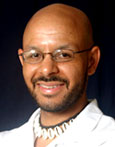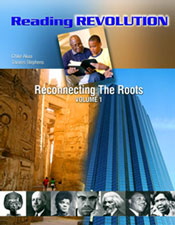FCNNEWSSOURCE

As a minister, educator and author of seven books, Chike Akua’s achievements are many. He is a highly sought after speaker and a respected scholar. His most recent offering with co-author Tavares Stephens is titled “Reading Revolution.” The book has already sold several thousand copies and is currently in its third printing. Chike Akua was recently in Chicago, IL at the Jacob Carruthers Center for Inner City Studies at Northeastern Illinois University to speak as part of the “African Origins on Tour” series. He went One-on-One with the Assistant Editor of The Final Call, Ashahed M. Muhammad to discuss his newest project, and its uniquely effective approach to teaching reading comprehension and improving critical thinking skills in Black children.
The Final Call (FC): Tell us about your newest project “Reading Revolution”

Chike Akua (CA): We know that we can raise cultural awareness and reading comprehension at the same time and that’s what “Reading Revolution” allows us to do. There seems to be such a focus today on standardized testing and meeting certain standards. What makes this book unique is that is a collection of ninety reading selections that are set-up in the standardized test format but each of the reading selections is about a different African or African-American person, place or event. It helps to expand that cultural awareness and create a foundation for our children to understand who they are, while at the same time improving and increasing their reading comprehension skills. When a child finishes this reading curriculum they will be standing on a firm foundation of cultural awareness that will allow them to pursue excellence and achievement.
FC: So this is the educational concept of connecting the student with culturally specific curriculum. For example, if a Black child is reading about American history, perhaps they don’t feel connected to the text therefore developing an aversion to history. However, if they are reading about the Kings of Africa or the history of Ancient Egypt, then they are connected, interested and possibilities for success and retention are increased.

CA: Absolutely, no question about it. There are so many people who complain that our children aren’t interested in reading or they are trying to figure out ways to get them interested. Well, if you put them in the center of the reading text then they are going to be interested in reading about themselves. That allows us as educators to really meet children where they are to help them better understand who they are. They have been led to believe that they are something other than great, something other than excellent and somebody has a vested interest in making them think that they are suppose to be ‘pimps’ and ‘players’. Somebody has a vested interest in making our children think that they have no history worth reading about or understanding. As Dr. Cheikh Anta Diop advised us, we have to go back and rescue and reconstruct our history and culture and put it back into the hands of those that created it. That’s why Volume one of “Reading Revolution” is called reconnecting the roots.
FC: The book has been adopted by some of the charter or alternative schools that are more open to alternative educational approaches, however, I read that the book has also been integrated into several public school curriculums across the United States?
CA: There are a number of administrators and people of good will who are really seeing the vision, but there are others whose backs are up against the wall so much to raise student achievement that they are now scrambling trying to figure out ‘is there something that I can do to reach these black children?’ When they see “Reading Revolution” it meets their needs in that regard because it is so practical and so user friendly. Any teacher that takes a look at it can see right away that it is something that they can go into the classroom tomorrow and use immediately and start getting results.
FC: As an educator, what is your greatest challenge in creating this type of curriculum?
CA: In creating this curriculum, it’s a matter of getting this information into the hands of our students. I have seen through my 14 years as a public school educator what this kind of information can do to transform students and take them from worst to first.
FC: Thank You.
(To order “Reading Revolution” now in its third printing or any of the other books by Mr. Akua, call 770.309.6664 or visit www.readingrevolution.org. Special rates are available for schools, and educators.)












